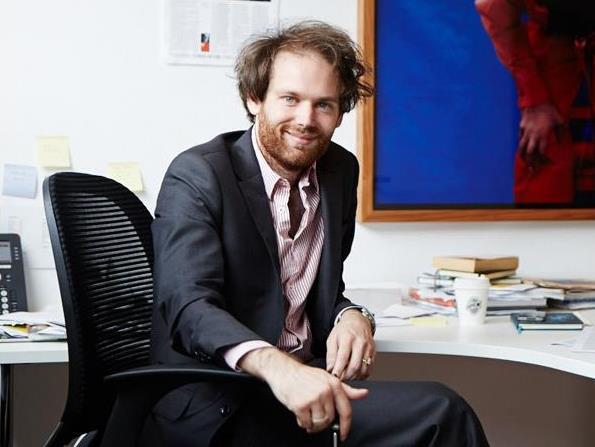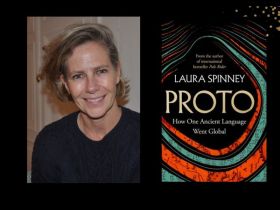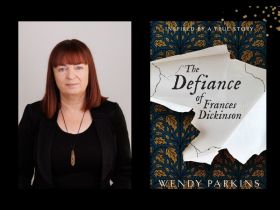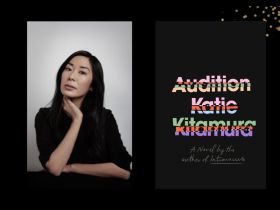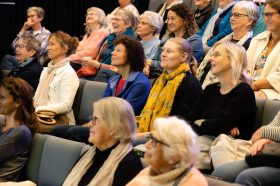Author and editor Erik Jensen. Photo by Sean Fennessy via www.thedesignfiles.net
The Real Julia
There was unusual chemistry between the two interlocutors, former journalist and Victorian state minister (ALP) Mary Delahunty (Gravity—My Year with the Prime Minister, Hardie Grant Books, Victoria 2014) and Erik Jensen (Acute Misfortune, the Life and Death of Adam Cullen, Black Inc, Victoria 2014), I noticed; both authors had graciously done their homework on each other’s books, so it was a real conversation.
As former Prime Minister Julia Gillard’s shadow throughout her final six months in office, 2013, Delahunty witnessed the rising tide of vitriol flowing into Gillard’s office, much of it attributable solely to Gillard’s gender. While Jensen’s subject, the late artist Adam Cullen, had wilfully lied his way through the project, Gillard’s issue was more that she had difficulty being herself when presenting in public. Yet Delahunty saw a woman who was open, witty and funny, and endowed with a ‘forensic mind’, as well as ‘a beautiful Welsh skin’; also, to her enormous credit, Gillard never asked to preview or censor Delahunty’s profile of her.
Part of the problem, admitted Delahunty, is that the current 24/7 media cycle deprives journalists of the time they could spend with politicians to really get to know them. Although Gillard largely kept her cool, in her own private time, to which Delahunty had unprecedented and exclusive access, she did show the pain inflicted by the unrelenting attacks on her, including those from within her own party. Delahunty confirms that towards the end, Gillard was in retreat, spaced-out even: ‘She just wasn’t there, it wasn’t her.’
Community
I found social researcher Hugh Mackay’s presentation on the way we live—and the way we should live—a bit too predictable to be truly exciting. Mackay’s wise and passionate commentaries on the mistakes of modern life are already well known, and his latest, sixteenth, work, The Art of Belonging, it’s not where you live, it’s how you live (Macmillan Australia 2014) continues the theme set in his 2013 bestseller The Good Life: that we cannot live ‘the good life’ in isolation from community or in pursuit of purely individual, selfish goals, since humans are social animals, hopeless in isolation, and by nature cooperative and collaborative. Mackay charts the radical changes our society has undergone: more divorce, less marriage; the lowest birth rate in history, resulting in almost pathological ‘over-parenting’; working parents sapping time and energy that could have been devoted to building community; the rise of single-parent households; extreme mobility, with Australians moving house every six years; the rise of IT and the Internet; the loss of notions of privacy and identity, although we install bars and locks all over our homes. ‘The cumulative effect,’ says Mackay, ‘is that people feel less engaged and less secure in their own neighbourhoods’; only 35 per cent of Australians say they trust their neighbours, let alone actually know them. Yet, says Mackay, our social and moral health depends on engaging with community.
Botanical Odyssey
From moss to roses, I journeyed through a botanical wonderland when attending the two separate sessions with celebrated Eat, Pray, Love American author Elizabeth Gilbert (The Signature of All Things, Viking/Penguin, Australia 2013) and the less well known (in Australia at least) but erudite Italian journalist and writer Andrea di Robilant (Chasing the Rose, an adventure in the Venetian countryside, Allen & Unwin, NSW 2014).
Gilbert is charismatic onstage, generous with trenchant lines such as ‘The highest contract a novelist has with the reader is to delight. I don’t think we should bore each other’, or ‘All art is collage: you just arrange it and glue it all together, and then it becomes yours.’
The protagonist of Gilbert’s sweeping new novel is an American female botanist Alma Whittaker, whose birth at the dawn of the 19th century places her in an era when science first signalled its imminent ascendance and the theory of evolution was growling in the wings. Philadelphia’s Quaker pharmacists, biologists Alfred Russel Wallace and Charles Darwin, Captain Cook and his botanist-in-residence Sir Joseph Banks, all find a place in the story. And as Gilbert herself confesses, this is a ‘stealth feminist novel’ that examines unrequited female desire as much as science; but its scope is far broader than that, ranging across the globe, from London’s Kew Gardens to Tahiti.
Also a ‘plant-voyager’ like Alma, Andrea di Robilant, who writes in English and then rewrites in Italian, has tracked the journey of an enigmatic, exquisitely perfumed silvery-pink rose of Chinese origin discovered in historic gardens at Alvisopoli, north of Venice. This is an old, old rose. The site was once the pride and joy of di Robilant’s own great-great-great-great-grandfather Alvise Mocenigo, who in the eighteenth century created a model town there. Andrea, by his own admission no gardener, took a cutting of this rose, named Rosa Moceniga, and unceremoniously plonked it into his own apology for a backyard, where to his great surprise, it flourished, despite the chilly Venice winters. This stubborn display of resilience pushed Andrea to create more salubrious horticultural surroundings for his gorgeous guest.
Then Andrea discovered while researching other topics in the Venetian archives, a diary kept by Alvise Mocenigo’s wife Lucia in the waning days of Napoléon’s empire. Lucia had connected well with Napoléon’s former Empress Josephine, who tutored her in horticulture, so that when the Napoleonic Empire collapsed in 1814, Lucia returned to Alvisopoli with considerable knowledge. She created elegant gardens there, including rose gardens. Using cutting-edge scientific technologies as well as a sleuth-like gift for research, Andreas has painstakingly traced the origins of the enigmatic rose of Alvisopoli, with the help of a florid array of characters, not least the elderly rose gardener extraordinaire, Eleonora Garlant, who actively communicates with her plants. Yes, plants like roses can talk, to each other, and to gardeners, as Andrea learns from Eleonora, and even from at least one eminent scientist.
The easy-going chatty relationship that the roses have fostered with Eleonora has relaxed them, encouraging them to hybridise freely, producing several new and rare natural hybrids every year; there are now 60 varieties of rose found in Eleonora’s garden that are found nowhere else in the world, a fount of life in a world of declining biodiversity.
Perth Writers’ Festival
19-22 February as part of Perth International Arts Festival
www.perthfestival.com.au
